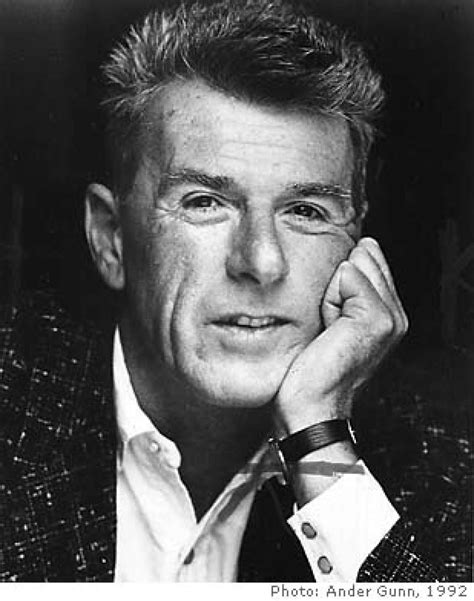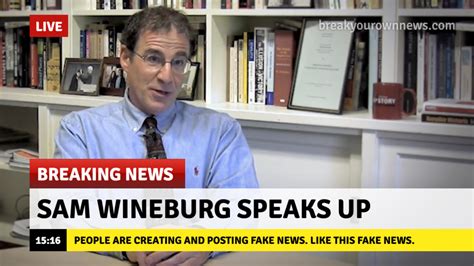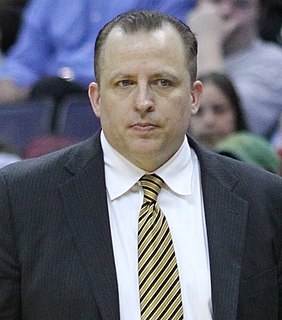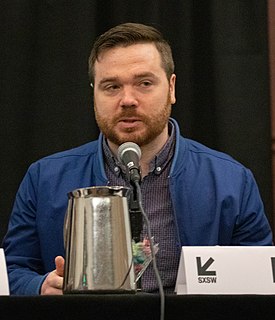A Quote by Dean Spade
I often notice how students can gain the capacity to use certain critical methodologies through engaging with very different texts - how a graphic novel about gentrification and an anthology about Hurricane Katrina and a journalistic account of war profiteering might all lead to very similar classroom conversations and critical engagement. I'm particularly interested in this when teaching law students who often resist reading interdisciplinary materials or materials they interpret as too theoretical.
Quote Topics
About
Account
Anthology
Capacity
Certain
Classroom
Conversations
Critical
Different
Engagement
Engaging
Gain
Gentrification
Graphic
How
Hurricane
Hurricane Katrina
Interdisciplinary
Interested
Interpret
Journalistic
Katrina
Law
Law Students
Lead
Materials
Might
Notice
Novel
Often
Particularly
Reading
Resist
Similar
Students
Teaching
Texts
Theoretical
Through
Too
Use
Very
War
Related Quotes
When I get interested in a new topic I teach a class on it. There's a graduate seminar I teach in which the students and I try to expand the terminology we use to talk about poetry as well as expand our notion of what makes a poem - we read source texts on architecture, dance, photography, film and the graphic novel.
One of the things about being a law student is that the academic discipline of law is very often removed from the practical reality of law. How to complain, who to complain to, and whether or not you even need to invoke the law is very different in the real world from how it's examined in the lecture theatre.
Teaching, like any truly human activity, emerges from one's inwardness, for better or worse. As I teach I project the condition of my soul onto my students, my subject, and our way of being together. The entanglements I experience in the classroom are often no more or less than the convolutions of my inner life. Viewed from this angle, teaching holds a mirror to the soul. If I am willing to look in that mirror and not run from what I see, I have a chance to gain self-knowledge-and knowing myself is as crucial to good teaching as knowing my students and my subject.
I was always interested in the larger picture, I was pre-law in college, and had a degree in economics. I was very interested in the big question 'how then shall we live?,' how do we organize as a civilization when we are so different, and often don't get along, yet we know at some point we have to unite for the common good? I actually really care about those issues, and I'm driven to understand how it works.
I regret that there aren't more short stories in other magazines. But in a certain way, I think the disappearance of the short-story template from everyone's head can be freeing. Partly because there's no mass market for stories, the form is up for grabs. It can be many, many things. So the anthology is very much intended for students, but I think we're all in the position of writing students now. Very few people are going around with a day-to-day engagement with the short story.
... teaching cannot be a process of transference of knowledge from the one teaching to the learner. This is the mechanical transference from which results machinelike memorization, which I have already criticized. Critical study correlates with teaching that is equally critical, which necessarily demands a critical way of comprehending and of realizing the reading of the word and that of the world, the reading of text and of context.
In some of the classes, especially the introductory religion courses I took, the professors can veer into a particular strain of religious anti-intellectualism. Professors typically aren't given tenure at Liberty, so there's pressure to hew to the party line on religious and social issues. I didn't see a whole lot of my professors encouraging critical thinking among their students. Which isn't to say that students don't engage critical thinking skills at Liberty - just that it wasn't part of my classroom experience there.
The chemists work with inaccurate and poor measuring services, but they employ very good materials. The physicists, on the other hand, use excellent methods and accurate instruments, but they apply these to very inferior materials. The physical chemists combine both these characteristics in that they apply imprecise methods to impure materials.





































